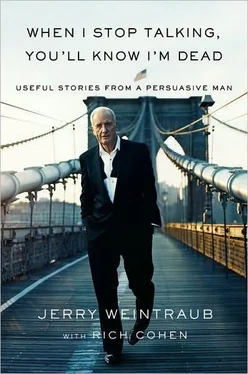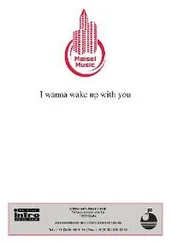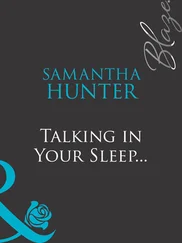He looked at me, sizing me up, then said, "I want you here tomorrow at seven o'clock."
I went back the next night, drank with the boss, then the guys came in. The boss sat them down and said, "Let me explain something to you two. Jerry is now my nephew. He is under my protection. Nobody touches him. Nobody gets near him. In fact, if anything happens to him while he's in Brooklyn, you two guys are responsible."
After that, I could not go to the bathroom in Brooklyn without these two guys following to make sure I did not trip and bang my head on the toilet.
Even after the show closed, I continued to stop by the club on the East Side to say hello to the boss. We started a friendship that lasted the rest of our lives. He flew to Beverly Hills for my son Michael's Bar Mitzvah. The boss is still around. He's an old man now, but is still being watched by the FBI.
Sometime in the late 1970s, I had a conversation with Steve Ross, the chairman of Warner Bros. He wanted me to put in some money so we could buy the Westchester Premier Theatre, which was near his house. By then I had long worked with Sinatra and Elvis, and many others, so it made sense. We could fill it up with top-drawer entertainment. "Beautiful," I said, "start writing the papers." A few days later, I get a call. It's the boss. He says, "Meet me at the Grotto. We need to talk." He meant the Grotto Azura, one of the oldest restaurants in Little Italy.
We sat in the main room, the boss with his back to the wall.
He said, "Jerry, you broke your promise."
"What promise?" I asked.
"Remember," he said, "you promised you would never get involved with anything illegal."
"Yeah," I said, "but I kept that promise."
"No, you haven't," he said. "You're buying the Westchester Premier Theatre, aren't you?"
"Yes."
"Well, who do you think owns the Westchester Premier Theatre? We do, through waste management. We have the garbage contract. And we have seats there we don't manifest. That's illegal. And I'm not getting out of the theater just because you're buying. Which means you will be involved in something the world considers illegal."
"Oh, shit," I said. "What should I do?"
"Don't buy it."
The next morning, I called Steve Ross and told him, "I'm not buying into this theater, and neither should you."
When I told him why, he dismissed me, saying, "Oh, come on, don't be ridiculous."
So I didn't buy into the theater, and he did, and it gave him a lot of trouble.
Over the years, as I booked acts, I became friends with the guys who ran the resorts in the Catskills, in the Poconos, in Vegas. Now and then, they would turn their theaters over to me for the thirty or so dead nights that followed New Year's. Nothing is selling anyway, why not give Jerry a shot? I would invent shows out of nothing, the wilder the better, parties and extravaganzas, packaged and marketed like mad. It became my trademark: "A Night in Paris," "A Night in London." Nutty stuff, scrap. I had an act I had been trying to break forever: Kimo Lee and the Modernesians, a sword dancer, a singer, and two girls swaying in grass skirts. I had them booked in the Latin Quarter, in New York City, for $750 a week, but wanted to move them to the next level. Then, one day, I get a call from Morris Landsbergh, who sort of ran the Flamingo in Las Vegas. I say sort of because Landsbergh was really just a front for Meyer Lansky. Landsbergh would walk around the casino all day in a blue coat, hair parted, saying, "Hey, how are ya," "Nice to have ya." "Hey, thanks for coming!"
"Jerry, I'm in a jam," Morris tells me. "I need an act for Christmas. What do you got?"
This is the moment: three lemons line up in the slot machine and you wait to see if the fourth will drop.
"How much can you pay?" I ask.
"Fifty thousand dollars a week," says Morris.
Okay. This was real money. At the time, the highest-paid performer in Vegas was the opera singer Mario Lanza, and he was getting fifty a week. Frank Sinatra and those guys were getting twenty-five.
"Oh, sure," I say, "I've got something."
"Well…"
"Well, what…?"
(I'm thinking.)
"What do you have?"
"Well, I will tell you what I have…"
(Still thinking.)
I had been reading James Michener's Hawaii. I had never been to Hawaii, but I loved the book. My mind was filled with volcanoes and pigs on spits, shiny dwarf apples shoved between their teeth, and, at the same time, I had this act I was trying to break, so naturally I concoct.
"I have an unbelievable show," I tell Landsbergh. "In fact, it's not just a show. It's an experience. It's called 'A Night in Hawaii.' "
" 'A Night in Hawaii '? What the hell is 'A Night in Hawaii '?"
" 'A Night in Hawaii,' " I tell him, "is fifty beautiful dancing girls. 'A Night in Hawaii ' is waitresses in grass skirts, pigs on spits, the mood of the islands. 'A Night in Hawaii ' is a mountain erupting and lava flowing as the music plays!"
"Wow," says Landsbergh. "That sounds like a hell of a show! But as great as it sounds, I don't know if it sounds like a fifty-thousand-dollar show. Now, if you had Arthur Godfrey…"
Arthur Godfrey was one of the first great TV stars. He had two shows on CBS: Talent Scouts and The Arthur Godfrey Hour. He also had a famous love for Hawaii. He played ukulele and did a whole Pacific islands routine.
"Well, it does!" I tell Landsbergh.
"Does what?"
"Have Arthur Godfrey. In fact, the show is called 'Arthur Godfrey's A Night in Hawaii.' "
"How much?"
"Fifty thousand dollars a week, maybe fifty-five thousand."
"Great! Done! Deal!"
And now I had to get Arthur Godfrey.
I waited until the end of the day, then went down Broadway to the theater where Godfrey taped Talent Scouts. There was a security guard with a clipboard and a gun. I have a theory. If you act like you're in charge, no one will stop you. So I go up this guy with a piece of paper in my hand and ask him a bunch of questions-"How long is your present shift?" "Did you find your training adequate to the task?"-say, "Thanks, you're doing a great job," pat him on the shoulder, then walk past him to the elevators. No problem. When I get up to the floor, I wander around until I find a dressing room with Godfrey's name on it. He was one of the biggest stars in the country-you were not supposed to just bang on his door, but, you know, the fourth lemon, the fourth lemon.
Knock, knock, knock.
"Who's there?"
"Jerry Weintraub."
"Oh, yeah, hey, Jerry, come in!"
He probably thought I was the cigar boy.
He was sitting in a chair, napkin around his neck, looking in the mirror, dabbing a pancake pad all over his face. In those days, they all did their own makeup. He was an elegant man with a clean, vanilla way about him. The singer Eddie Fisher said that Godfrey was anti-Semitic. The hotel he partly owned in Miami Beach, the Kenilworth, did not allow Jews. But he was nice to me. "What can I do for you?" he asked.
I said, "Well, Mr. Godfrey, I've come to you with an opportunity to make fifty thousand dollars a week."
"Wow, what is it?"
"It's a show in Las Vegas," I told him. "It's called 'Arthur Godfrey's A Night in Hawaii.' "
"You mean a floor show?" he asks.
"Yeah," I tell him. "In one of the big hotels."
"No, sorry, kid. It's my policy. I don't work live."
"Yeah, but fifty thousand dollars a week," I say. "Maybe more."
"Nope," he says. "Don't work live."
"Yeah, but listen," I say, "you'll be on stage with fifty beautiful Hawaiian girls, and here is the best part: You and I will go to Hawaii and pick them out personally, right off the beach!"
He looks up, like, Wait, FIFTY Hawaiian girls? Frowns and says, "Yeah, but it would still be live."
I went on and on, but could not talk him into it. He was scared to death of a live audience. Well, he was then, anyway, because he did call me years later, when his TV career was on the wane, and said, "Jerry, I'm ready to play Vegas. And I want to bring my horse on stage. And I want you to book it." And I did book it, and he did bring his horse on stage.
Читать дальше

![Сьюзан Кейн - Quiet [The Power of Introverts in a World That Can't Stop Talking]](/books/33084/syuzan-kejn-quiet-the-power-of-introverts-in-a-wo-thumb.webp)










